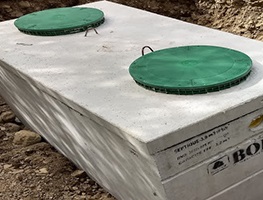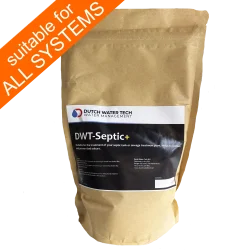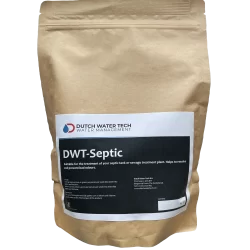Home » Knowledge base » Septic tank decomposition
Septic tank decomposition: Effective methods to improve decomposition
The decomposition of waste materials in a septic tank is a crucial process to ensure that wastewater is treated in an efficient and environmentally friendly manner. A key aspect of this process is the use of products such as septic tank activators that can significantly improve decomposition. In this article, we will explore in detail the importance of septic tank decomposition, the mechanisms behind it and the benefits of septic tank activators.
What is a septic tank and why is decomposition important?
A septic tank is an underground container used to treat domestic wastewater. Solids settle in the septic tank and form a sludge layer, while liquids drain into the ground or into other treatment systems. The decomposition process in the septic tank is essential to reduce the amount of sludge and minimise unpleasant odours.
Important points on decomposition in septic tanks
- Biological processes: Microorganisms play a key role in the decomposition of organic materials.
- Time and efficiency: The efficiency of the decomposition process can vary, depending on factors such as temperature, pH and the type of organic waste.
- Prevention of problems: Inefficient decomposition can lead to problems such as blockages, overflows and pollution.

The role of microorganisms
Microorganisms are at the heart of the decomposition process in septic tanks. They break down organic material and convert it into less harmful substances. There are different types of microorganisms that are active in a septic tank, including aerobic (oxygen-dependent) and anaerobic (oxygen-independent) bacteria.
Septic tank activators: What are they and how do they work?
Septic tank activators are specialised products designed to improve decomposition in septic tanks. These products usually contain a mixture of natural bacteria and enzymes that accelerate the decomposition process and make it more efficient.
Factors that influence the activity of microorganisms:
- Temperature: Higher temperatures promote the activity of microorganisms, while low temperatures slow it down.
- pH value: A neutral to slightly alkaline pH value is optimal for most types of bacteria.
- Nutrients: Microorganisms need sufficient nutrients to work efficiently.
Advantages of using septic tank activators
- Accelerated decomposition: The addition of extra bacteria and enzymes accelerates the decomposition of organic matter.
- Reduction of odours: More efficient decomposition reduces the formation of odorous compounds.
- Less maintenance: Better decomposition means less sludge formation and therefore less frequent emptying of the septic tank.
- Environmental protection: Efficient decomposition minimises the release of harmful substances into the environment.
-
Septic Tank Bacteria Booster | Concentrated Formula
Septic tank bacteria £51.45 £42.88 (excl. VAT) Add to cart
Application of septic tank activators
The application of septic tank activators is generally simple and can be used for both new and existing septic tanks. The exact dosage and frequency of application depends on the size of the septic tank and the amount of wastewater to be treated.
Steps for the application of septic tank activators
- Dosage: Follow the manufacturer’s instructions regarding the amount of activator. For example, our Septic Tank Activator is suitable for tanks up to 3,000 litres.
- Schedule: Regular application. To ensure the proper operation of your septic tank, we recommend annual dosing of the activator.
- Direct addition: The activator is added directly to the septic tank or to a designated inlet system.
- Monitoring: Observe the changes in the septic tank, especially with regard to odour and sludge formation.
Practical tips
- No chemicals: Avoid the introduction of strong chemicals that can damage the microorganisms in the septic tank.
- Regular maintenance: Have your septic tank checked and emptied regularly by professionals.
- Biodegradable products: Use biodegradable cleaning products to support the microbiological balance in the septic tank.
- Water consumption: Reduce water consumption to minimise the load on the septic tank.
Decomposition in septic tanks is a complex but essential process for effective wastewater treatment. The use of septic tank activators can significantly improve this process by increasing the activity of microorganisms and accelerating decomposition. With proper care and regular use of activators, septic tanks can operate more efficiently, require less frequent maintenance and be more environmentally friendly. It is therefore worth investing in high-quality septic tank activators and establishing them as an integral part of septic tank maintenance.
Our recommended products
-
DWT-Septic Plus – Septic Tank Bacteria – 1kg
Cesspool Bacteria Treatment £57.45 £47.88 (excl. VAT) Add to basket -
Septic Tank Bacteria Booster | Concentrated Formula
Septic tank bacteria £51.45 £42.88 (excl. VAT) Add to cart -
Roebic K37 Septic Tank Treatment | Concentrated Formula
Septic tank bacteria £27.95 £23.29 (excl. VAT) Add to basket -
DWT-Septic – Septic Tank Additives – 1kg
Cesspool Bacteria Treatment £46.95 £39.13 (excl. VAT) Add to basket





